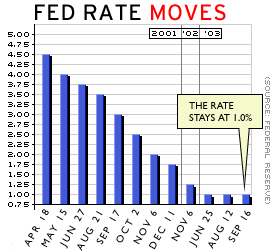NEW YORK (CNN/Money) -
Treasury Secretary John Snow's comments about interest rates temporarily roiled financial markets Monday but mostly left economists scratching their heads.
In an interview with the Times of London, Snow said he expected interest rates to rise next year as a result of the rebounding economy, and suggested the Federal Reserve would not hesitate to raise rates in a presidential election year.
In a Times interview this past summer, Snow described the U.S. economy as being "coiled like a spring" -- in the latest interview, he said "the spring has now sprung."
As a result of Snow's prediction of faster growth and rising rates, Treasury bond prices fell in early trading, in part because investors believed Snow had some inside scoop about the future of U.S. interest-rate policy.
Bond rates move opposite to price, and if interest rates are going to rise significantly next year, as Snow suggested, then bond investors figured they should get out while the getting was good.
"Traders realize Snow has weekly breakfast meetings with [Fed Chairman] Alan Greenspan, and they thought his comments might reflect some type of informed opinion," said bond analyst Anthony Crescenzi of Miller Tabak & Co.
Officials at the Treasury Department and the White House quickly moved to clarify Snow's remarks, saying they weren't meant to hint at future Fed policy but were just musings on the typical relationship between economic growth and interest rates. This "clarification," along with a weaker-than-expected reading of leading economic indicators, helped Treasury prices recover a bit by midday.
Economists, however, wondered why Snow felt compelled to talk about interest rates at all.
"I wouldn't disagree with some of the things he said, but I don't know why he said those particular things at this time," said Gary Thayer, chief economist at A.G. Edwards.
For one thing, there's a long-standing tradition that Fed officials don't comment on currency issues, which fall in Treasury's jurisdiction, and that Treasury officials don't comment on interest-rate issues, which are the bailiwick of the Fed.
"It doesn't seem to me at all appropriate for a secretary of the Treasury to make such comments in any event," said former Fed Governor Lyle Gramley, now a consulting economist at Schwab Washington Research.
Snow's comments dangerous?
Other economists worried Snow's comments could undermine the Treasury Department's recent efforts to keep a lid on the dollar's strength. The dollar rose Monday morning, as the prospect of higher U.S. interest rates attracted foreign investors to U.S. markets.

What's more, Snow at least temporarily spoiled the Fed's recent campaign to reassure markets it wouldn't raise rates anytime soon. Bond markets had only recently recovered from the effects of some mush-mouthed miscommunication from the Fed this summer, and Snow's comments threatened to send bond investors for the exits again.
"By talking about interest rates rising again, you can precipitate them rising too early in a recovery -- that's why he shouldn't be talking about it," said Lehman Brothers chief economist Ethan Harris.
The Fed cuts short-term rates when it wants to stimulate the economy and raises them when it wants to fight inflation. It's cut its key short-term interest rate 13 times since January 2001, in response to a recession, the bear market in stocks, terror attacks and a host of other woes.
With the economy turning in stronger growth lately, some traders have begun to speculate about when the Fed might start to raise rates again. Snow's comments drove the federal funds futures contract and other market indicators to price in a good chance for a rate hike in March of 2004, much earlier than most economists expect.
| Related stories
|

|
|
|
|
If those sorts of expectations take hold and push other interest rates higher, economic growth could suffer.
"It's much too early for the Fed to be thinking about hiking interest rates. It would be a very dangerous action on their part in this fragile initial stage of the recovery," Harris said.
Setting the bar too high?
Then again, some economists said data and comments from the Fed itself will likely have a more lasting impact on market expectations of Fed policy than some comments from the Treasury Secretary -- who, after all, has no power over the Fed.
Fed policy-makers are widely expected to hold their target for short-term rates steady when they meet next week, at the lowest level in more than 40 years. And they'll probably signal again that rates will stay low for some time, many economists believe.
If anything, Snow's comments may have simply been an effort, clumsy or not, to talk up the economy in advance of the 2004 presidential election.
But by predicting, as he did, that the economy will add 200,000 jobs a month from now until October 2004, Snow may have set the bar for economic performance too high, subjecting the Bush administration to ridicule if such job growth fails to materialize.
And more of these off-the-wall comments could eventually be harmful to Snow's job security.
Northern Trust economist Paul Kasriel pointed out that Snow's predecessor, Paul O'Neill, was forced to resign last year in part because he was seen as something of a loose cannon.
"O'Neill was like the offensive line of the Green Bay Packers playing in a dome -- they can't hear signals," Kasriel said. "O'Neill couldn't hear the signals the White House was sending, and they got rid of him. Presumably, Snow has better hearing."

|

